- Home
- Q. Patrick
Cottage Sinister Page 9
Cottage Sinister Read online
Page 9
The Archdeacon grunted. He had the normal man’s healthy dislike of hospitals and the atmosphere of disease and death.
“I’ll take you to the matron, if you don’t mind. I have a tonsillectomy and a laparotomy to perform this morning and mustn’t keep my patients waiting. Oh, Mrs. Bedford—!” They entered the matron’s office. A stout, grey-haired woman rose briskly to greet them.
“Mrs. Bedford, this is Inspector Inge, from Scotland Yard. He’s investigating the two deaths in the Lubbock family. I wonder if you’d mind answering his questions and seeing he gets all he wants. I’m due in the operating room now. Oh, and before I forget, matron, you’d better put that new nurse in number three. I doubt if Nurse Lubbock will be in for a day or two. Is Crosby around?”
“No, doctor, not yet. I’ll attend to your instructions and I’ll certainly do all I can for this—er—gentleman.”
The Archdeacon bowed appropriately to the matron and made a valedictory gesture towards Dr. Hoskins, who was hurriedly slipping on a white coat as he went down the passage.
“Sister,” called the matron in a raucous voice, “sister, put Wheeler in number three in Lubbock’s place.” She turned towards the Archdeacon and remarked more to the circumambient ether than to him in particular:
“Such a nuisance, these pretty girls who are always getting into trouble—”
“Meaning Miss Lubbock, ma’am?”
“Who else,” snapped Mrs. Bedford. “She’d have made a good nurse if she’d been as plain as poor pathetic Miss Pinkney. But a pretty face in a hospital is worse than a case of bubonic plague. She’s turned Dr. Crosby’s head completely, and Dr. Hoskins always treats her with as much consideration as if she were a prize heifer. If it weren’t for the fact that she’s a special protégée of Lady Crosby’s, I’d have—but what can I do for you, sir.”
The Archdeacon outlined the special reason for his visit.
“Oh, you’d better see Miss Pinkney, our dispenser,” said the matron, “I’ll take you right up.”
In a room full of bottles, pipettes, scales and weird odors, the Archdeacon was introduced to a thin, pimply girl who gave the impression that she lived on an admixture of pharmaceutical concoctions and the sense of her own refinement.
The Archdeacon explained, rather in the manner of one who is trying to match a sample of wool, that he was interested in drugs of the atropine series. He had remembered the phrase from the autopsy report.
He was rewarded with a verbal torrent in which organic and inorganic chemistry, social distinctions, pharmacology and physiology were all felicitously blended. From which he finally gathered that atropine was used frequently but hyoseine never, and that Miss Pinkney was quite a “cut above” all the other inmates of the hospital! Finally she produced a bottle labeled ATROPINAE SULPHAS.
“Theah might be some Hyoscine in that cupboard theah,” said Miss Pinkney in tones of ineffable refinement. “It contains a lot of old Dr. Crampton’s supplies—he was the predecessah of Dr. Hoskins, you know. I shall be glad to ascertain for you.”
After much rummaging about and unnecessary “deah me-s,” Miss Pinkney produced from a back shelf a dusty, half-used bottle labeled HYOSCINAE HYDROBROMIDUM.
“This is all I can find, Inspectah,” she said at last, “it must have been heah for yeahs and yeahs. Deah me, I’m all dusty!” The Archdeacon picked up the bottle gingerly as though he were handling an infernal machine, and examined it carefully. Finally he wrapped it in a handkerchief and asked permission to slip it in his pocket.
“Is that cupboard kept locked?” he asked.
“No,” replied Mrs. Bedford, “but we always keep the Dispensary locked when Miss Pinkney is not here. There are drugs and poisons in this room and it would never do for unauthorized persons or patients to get hold of them.”
“Quaite,” agreed Miss Pinkney with an air of importance.
“But the nurses, Miss Pinkney—don’t they occasionally come in here? Miss Lubbock for example—?” He did his utmost to make his question sound quite casual.
“Oh, quaite; Inspectah, quaite, but I don’t encourage it. You see, my fathah was a doctah, and he didn’t think much of—” she paused, glancing uneasily at Mrs. Bedford, “I mean, I keep myself pretty much to myself. A girl—especially a doctah’s daughtah—can’t be to careful whom she mixes with, you know.”
The Archdeacon nodded sympathetically, as though he, at least, understood the peculiar difficulties with which “doctahs’ daughtahs” are faced in a cold hard world.
“But since you mention Miss Lubbock, Inspectah, I might ventchah to remark that she does come in heah with some frequency. I thought that possibly she was trying to—ah—cultivate me seeing that Lady Crosby has educated her rathah above the station for which she was intended by Natchah She pops in at odd times in quite a familiah mannah, in fact she came in heah last Saturday, I remembah, to ask my opinion as to whethah it would suit her to cut her haiah in the same style as Miss Darcy’s. I discouraged her, of course, as I’m sure Miss Darcy—who comes in heah to see me quite often—would not care to be imitated in that way. In short, Inspectah, I never encourage her much. As I said before, a girl can’t be too careful whom she mixes with.”
The Archdeacon looked at her long and intently—so long, in fact, that he might have almost counted the pimples on her face—so intently that the pale, thin countenance blushed to a deep crimson beneath his scrutiny. Then he spoke to her slowly and ponderously, with marked emphasis on all his monosyllables.
“You are quite right, Miss Pinkney, a girl can’t be too careful … can’t—be—too—careful…!”
V
From Miss Pinkney and Mrs. Bedford the Archdeacon did little more than establish the availability of the Means of death, which, with Motive and Opportunity were, to his mind, the Alpha and Omega in any self-respecting analysis of a murder case. It had taken him but a very little while to reduce the two women to the “squeezed lemon” stage, and now he had more important fish to fry. The matron and dispenser had been mere sprats, but Sir Howard Crosby was a whale—and a whale that could not be kept waiting. A glance at his heavy hunter showed him that it was after half-past eleven and he was, therefore, obliged to cut short Miss Pinkney’s voluble excursus on the subtle social distinction between nurses and dispensers. He was due at the Hall by twelve—a mile walk across the fields, as Mrs. Bedford had obligingly explained.
He took the foot-path through a large open meadow, heavy with uncut hay. Even to an unimaginative soul like the Archdeacon the warm smell of clover was intoxicatingly sweet, and the droning of bees in the noonday air seemed to be reproaching him for the nature of his mission in Crosby-Stourton and for thus violating the long and unbroken peace of the English countryside. It was a perfect midsummer day—one of those rare days which can occur only in England and which seem like unexpected birthday presents from a generous Creator in contrast to the habitual inclemency of the British weather.
The Archdeacon walked slowly through the meadows, idly plucking the long grasses and trying hard not to let the beauty of the scene distract his mind from the matter in hand. Leaving the fields behind him, he strolled up the driveway to the Hall and rang the bell just as the church in Crosby-Stourton struck the hour of twelve. An impeccable butler immediately ushered him into Sir Howard’s study—a large room panelled in oak and lined with books whose one purpose in life was to be a source of annoyance to the housemaids at spring cleaning time.
The eleventh baronet greeted him with a mixture of pomposity and cordiality: “Glad to see you, Inspector. I suppose you know that I’m responsible for your being here, in a sense. As a rule, we are capable of handling our own troubles, but what with one thing and another—Archer’s gout and the coroner’s absence—I felt my—er—responsibility to the village—my village, you know—and I rang up Scotland Yard myself. I flatter myself I have some little influence at Headquarters and the circumstances looked important enough to go to the Fountain Head—the Fountain He
ad, you know!” The Archdeacon did his best to look like a Fountain Head.
“But of one thing I am certain,” continued Sir Howard, in the voice of one who expects his opinions to be treated as facts rather than opinions, “that it was not the work of a local—er—individual. No one in this village, my village, could have done anything so—so—er—presumptuous.” Sir Howard gave the impression that if there were any poisoning to be done in Crosby-Stourton he was the only logical person to do it.
The Archdeacon inclined his head humbly, though he could not help thinking that he had overestimated the mental capacity of the aristocracy. He had hoped that Sir Howard might have something to Contribute that was new and startling—something outside the realms of mere conjecture.
“Apparently a stranger has been seen in the village,” continued Sir Howard weightily. “Have you ascertained as yet whether or not his movements were at all suspicious?”
“Not yet, Sir Howard—Buss is working on him, I fancy. That’s just a routine job. At present I am more interested in the local people themselves. People who might possibly have motives—there are one or two names about which I know nothing as yet, and I thought, perhaps, you might be so good as to help me. For example, several people have mentioned a Miss Vivien Darcy—”
“Miss Darcy!” the squire almost jumped from his chair with annoyance. His eyes protruded belligerently, “Miss Darcy! Who has had the impertinence to drag her name into this?”
The Archdeacon raised his hands as though in self-defence and then spread them out with a deprecatory gesture.
“Village gossip,” he murmured apologetically, “just village gossip—when things like this happen, you know—”
“I don’t give one single solitary damn what has happened,” spluttered Sir Howard apoplectically. “I don’t care if fifty village wenches have been poisoned, but Miss Darcy’s name is to be left out of this—is that clear?”
Sir Howard’s eyes glared with a feudal and fanatical light, but the Archdeacon stood his ground. He was not the man to be nonplussed by a blustering baronet.
“I might as well tell you, in strict confidence,” added the enraged landowner in a somewhat milder tone, “that I have a special reason for saying this. Miss Darcy is a charming girl, and her father, Sir Malcolm Darcy, is one of my oldest friends—why man, he is master of our pack!” The implication was that anyone connected with the Master of the Hounds was as remote from suspicion as Caesar’s wife. “But that is not the only reason. I have excellent grounds for believing that Miss Darcy will one day be my daughter-in-law. My son, Christopher, has grown up with her and it has always been the dearest wish of both families. I might add that I have been informed—and very credibly informed—that she is not altogether indifferent to him. I speak advisedly and in strictest confidence. That he is bound, sooner or later, to—er—reciprocate this attachment must be obvious to anyone with half an eye, though at present, I regret to say, he seems to have his head in a gas oven of infatuation over that Lubbock girl—a gas oven—!”
At this moment the door opened and Christopher entered the room. Except for the redness of his hair, there was not the remotest suggestion of a gas oven about him. There were, however, lines of fatigue and worry about his eyes and mouth, and the facetiousness with which he usually treated his father seemed this morning to spring from habit rather than high spirits.
“Sorry, father, but I just popped in to say good-bye. Didn’t know you were engaged—!” Sir Howard rose ponderously and introduced him to the Archdeacon. Involuntarily he performed the ceremony as though his son were a boy of sixteen instead of a young man of twenty-six.
“I’m very glad, indeed; to meet you, Dr. Crosby” (the Archdeacon positively exuded benevolence). “I was particularly hoping that I might have some of your ideas on these tragic occurrences. With your medical experience and your knowledge of the local folk—a knowledge that goes so much further back than Dr. Hoskins’—I’m sure you must have some very interesting theories.” There was no hint of malice in his voice.
“Well, well,” the young man replied with mock modesty, “I have a few random thoughts, it is true—just a few random thoughts. Call them the obiter dicta of a great brain, if you like. In the first place there seems to have been a positively indecent amount of tea-drinking going on just before each death. Women are devils for tea in this part of the world. I wonder if that is significant at all—”
“The tea-drinking in itself seems to have been innocent enough,” said the Archdeacon, watching the young man very closely. “All women of that class drink tea at odd hours of the day, you know. But—I would like to know why Miss Lubbock—Miss Lucy, I mean—rinsed out Isabel’s cup just before her death and then forgot all about it when I asked her. Now that seems to me to be of great significance.”
Christopher’s face was a perfect study in impervious amiability. “Quite simple, Watson,” he replied airily, “quite simple! Miss Lubbock is a nurse, as you doubtless know—a well-trained nurse too, and her training never deserts her even in an extremity. Now, I ask you, Inspector—Would any self-respecting nurse take water to a patient in a dirty cup? She rinsed it out automatically, I’m sure—probably did it in the twinkling of an eye and then forgot all about it.”
The Archdeacon looked palpably unconvinced.
“I have some more interesting theories, if you care to hear them,” continued Christopher jauntily, with a twinkle in his green eyes, “one nice, juicy, psychological theory which I expounded to Hoskins on Monday—”
“Yes?”
“I told him that there was only one person in the neighborhood who could possibly have done anything so preposterous and so illogical as to murder either of those girls—Mrs. Burwell!”
“Mrs. Burwell!” the Archdeacon jumped up excitedly while Sir Howard glared at his blotting pad. “Why, who is she? I haven’t met her yet, have I? I haven’t even heard of her—!”
“O she’s not a real person,” said Christopher with an amused smile at the Archdeacon’s excitement and Sir Howard’s obvious annoyance, “she’s what Coleridge would call ‘a blessed ghost,’ but I call her a hell cat. Incidentally she was once my grandmother! She’d have done it if she could, the old virago, but unfortunately she’s dead—yes, dead as the proverbial mutton and far more decomposed!”
“Dead and decomposed!” echoed the Archdeacon, in the voice of one who is doubtful as to whether or not it was the right moment to laugh at some obscure joke.
“Yes dead, and safely buried, thank the Lord. You needn’t even bother to dig the old hag up, she’s so dead, so very, very dead. If you can’t take my word for it, ask father.”
The Archdeacon turned to Sir Howard with a puzzled frown.
“The—er—lady to whom my son so irrelevantly and so irreverently refers, is—or rather was—my wife’s mother, Mrs. Burwell. She has been dead now for over two years, and this fact alone should spare her the exaggerated, though perhaps not entirely undeserved, epithets which my son heaps upon her. She was certainly not a woman of—er—prepossessing or pleasant disposition, it is true, but I fail to see that she or her foibles can have any bearing whatsoever on this present case.”
“There seem to be enough living people mixed up in this without bothering our heads over those who are dead,” said the Archdeacon with reproachful benevolence.
“‘The evil that men do lives after them,’” quoted Christopher blithely. “Well, I’ve shot my bolt, and given you all the progeny of my teeming brain—without, apparently, being overwhelmed with appreciation! Now I’m off. So long, father. Good-bye, Inspector. I’m afraid there’s nothing else I can tell you that Hoskins couldn’t do much better. He was in on the ground floor, you know.” He had just passed out of the room whistling a cheerful tune, when his father called him back. The red head reappeared round the door, but the rest of the body remained modestly invisible in the passage.
“May a mere father inquire where his son is going?”
“Certainly,
I’m going to Canterbury in the Morris Cowley—be back tomorrow.”
“And what on earth are you going to do in Canterbury?”
“Call on the Archbishop—” the red head disappeared and the door was shut with quite unnecessary vehemence.
Sir Howard shook his head sadly and tried unsuccessfully to look like an old and broken man. The Archdeacon did his best to appear sympathetic and solicitous, but, in reality, he was secretly amused. It titillated his sense of humor to witness unappropriate frivolity and mild domestic discord in the homes of the aristocracy, and he thought of the entertaining stories he would have to tell his wife on his return to London.
They talked for a while longer, mostly on the subject of the inquest, which, Sir Howard said, would have to be postponed until the following Monday. Finally the Archdeacon betook himself back to the Crosby Arms, where he topped off his breakfast kidneys with a large lunch of tripe and onions, followed by a monstrous, if somewhat incompatible, dish of strawberries and cream.
He rose from the table at peace with all the world—he had a cast iron digestion—and was just proceeding towards his room when a breathless voice informed him that he was wanted by London on the long-distance telephone. He followed the voice reluctantly.
“Hullo, are you there—?” there was no mistaking In spector Norris’ cockney accent.
“Nothing much to report, Archdeacon, but I thought you’d like to know how we’ve got along so far. I’ve been running around on the trail of Amy Lubbock, but haven’t found out anything particularly exciting. She had quite a few followers it seems, but none that would ’a been likely to do her in that way. There was a member of the Constabulary, P. C. Haines by name, as apparently thought her a ‘bit of orl right’ as the hoi polloi say. Admits he had also walked out once or twice with her sister, too, but there doesn’t seem to have been much to it anyhaow. Only suspicious thing about Isabel is that she bought a lot of new clothes jest before she left taoun. Aperiently they cost a deal more than the average lydy’s maid can afford. New too—not castoffs from some of the nobs—we know that ’cos we tryced ’em. Oh, and you might be interested to know that Hon. Mrs. Ribson—Isabel’s mistress—told me that Lady Crosby was at her house Sunday, and she saw her again at a meeting on Monday—just in case you want an alibi for her lydyship.” Norris chuckled noisily. “I don’t want to say anything yet, but we are on a trail that may lead to Myra Braoun. Will call you at once if we run her to earth, and that will probably be the end of this here cyse. Cherchey la femme, l sye, and if you find her—!”

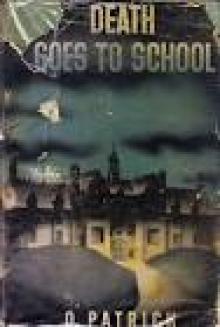 Death Goes to School
Death Goes to School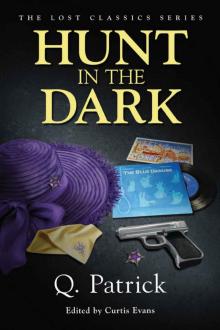 Hunt in the Dark
Hunt in the Dark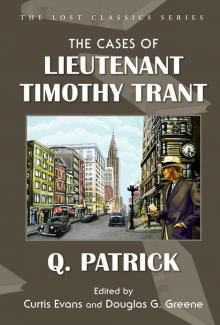 The Cases of Lieutenant Timothy Trant (Lost Classics)
The Cases of Lieutenant Timothy Trant (Lost Classics)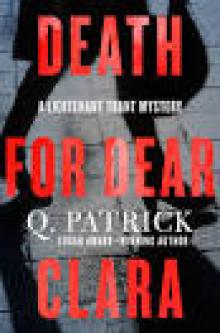 Death for Dear Clara
Death for Dear Clara S.S. Murder
S.S. Murder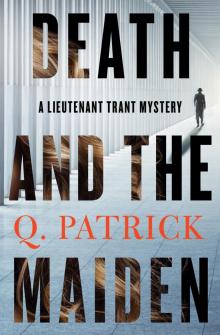 Death and the Maiden
Death and the Maiden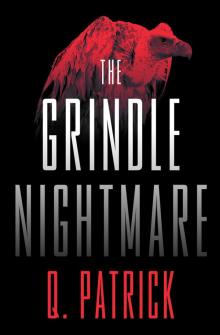 The Grindle Nightmare
The Grindle Nightmare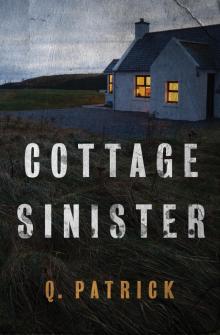 Cottage Sinister
Cottage Sinister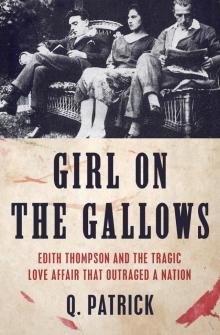 The Girl on the Gallows
The Girl on the Gallows